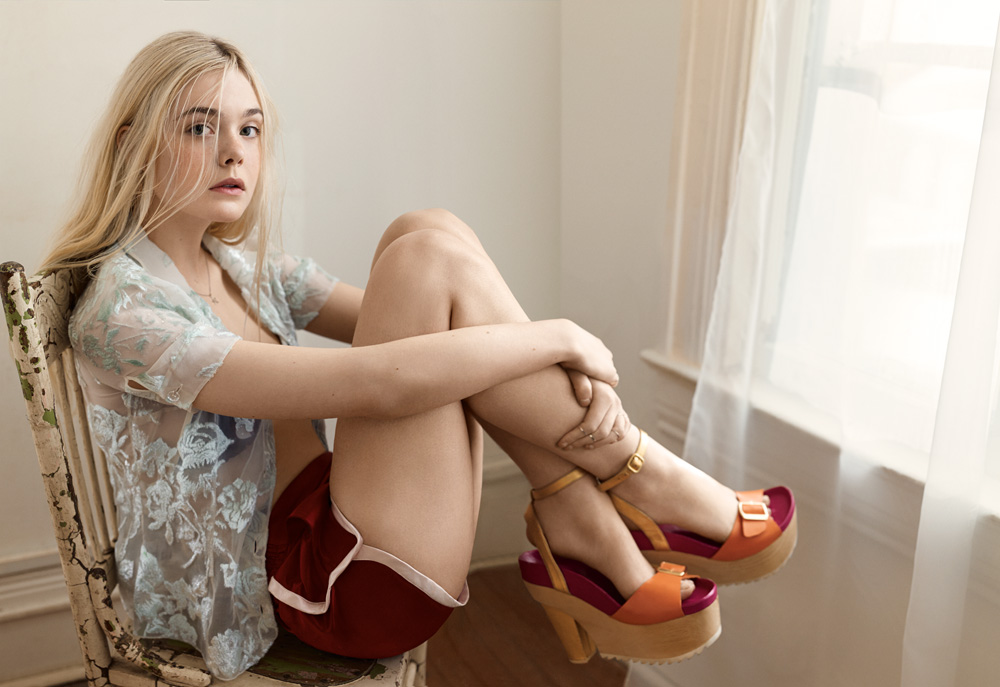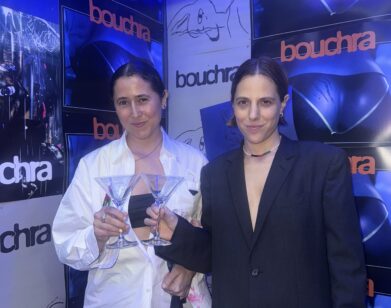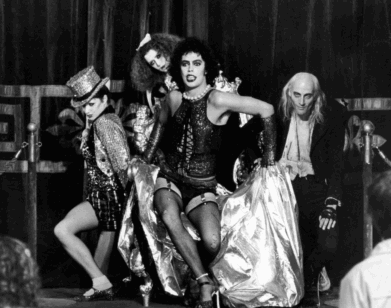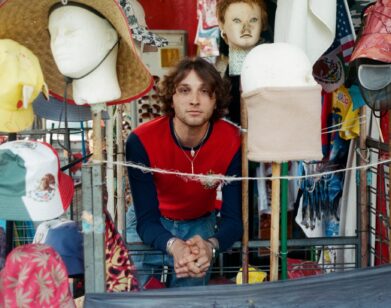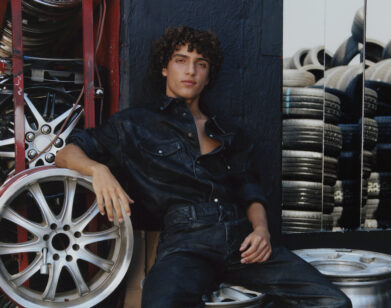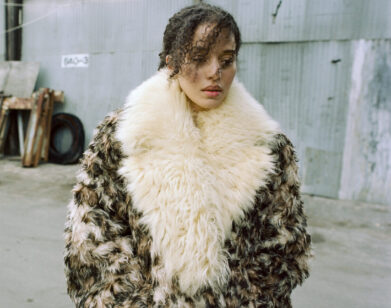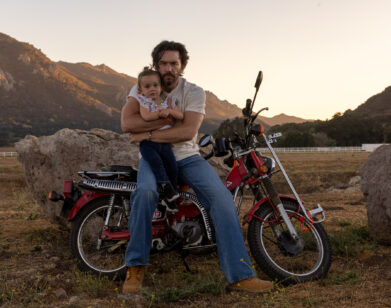Elle Fanning
I would like to be a teenager in the ’60s or ’70s. It just seemed so free, so cool, just roaming around. We can’t really roam around now. Elle Fanning
Elle Fanning has literally been acting for longer than she can remember. Chancing into a bit part in the 2001 Sean Penn vehicle I Am Sam before she turned two, Fanning followed her big sister Dakota into Hollywood with prestigious film work almost right off the bat. Early roles included The Door in the Floor (2004), Babel (2006), Reservation Road (2007), and The Curious Case of Benjamin Button (2008). Her charming performance as a movie star’s daughter in Sofia Coppola’s Somewhere (2010) seemed to announce a change—both a progression in her abilities as a performer and a distinctive taste in selecting projects—and since that time, Fanning has been putting together a series of impressive turns in increasingly impressive movies. Her performance as an English teen coming of age against the backdrop of the Cuban Missile Crisis in writer-director Sally Potter’s Ginger & Rosa (2012) was widely acclaimed. And earlier this year, she led an incredible cast (including John Hawkes, Peter Dinklage, and Glenn Close) in Jeff Preiss’s dark drama Low Down, about jazz musician Joe Albany. This month she gets to play the dreamy Princess Aurora—a.k.a. Sleeping Beauty—in Robert Stromberg’s Maleficent, a painterly adaptation of Charles Perrault’s fairy tale about the good princess, the enchanted forest, and one wicked fairy, and gets to hang out with her co-star Angelina Jolie in the process.
At last count, Fanning, who turned 16 this past April, has made 22 movies in her 14-year career, including Cameron Crowe’s We Bought a Zoo in 2011. While on the set of Zoo, Fanning and co-star Scarlett Johansson discovered that they had a lot in common. Both actresses love Paris, for example. Both had their breakthroughs playing a Sofia Coppola heroine lost in a luxury hotel, and now both have appeared on the cover of this magazine in their teens.
In March, the New Yorker Johansson called Fanning at her home in L.A. to talk about the young star’s love of Marilyn Monroe, about the perils of perfectionism, and her terror of the driving test.
SCARLETT JOHANSSON: Hi! This is such a thrill!
ELLE FANNING: This is so cool! I’m nervous.
JOHANSSON: Where are you?
FANNING: I’m at home in L.A.
JOHANSSON: Are you in school right now?
FANNING: No, it’s Spring Break for us, so we have two weeks off. Then tonight I’m actually going to my best friend’s house. She’s named Scarlett too. We’re going to Carmel in the morning.
JOHANSSON: Carmel is beautiful. Are you guys going to hang out and go shopping and hiking?
FANNING: We always break into the golf course. If you’re on Pebble Beach, you can climb up the rocks and get to the golf course. I guess it’s illegal but—
JOHANSSON: Well, now everybody knows! [laughs] You might need to change your plan of action. When I was your age, going to school was sort of a means to an end. What’s your relationship with school?
FANNING: I was homeschooled up until third grade, and I liked it because my grandma taught me, and I loved being with my grandma. But then I didn’t really have any friends, none my own age. So my mom put me in school in fourth grade. It’s cool because I’ve realized things about myself that I wouldn’t have if I weren’t in school. My favorite subject is science, which is so weird because I would think that my favorite subject would be, I don’t know, something more artistic. I only have two more years left now because I’m a sophomore. But I’m also excited to get out of school. [laughs]
JOHANSSON: Do you think you’re going to apply to college?
FANNING: I’m trying to decide. My sister is at NYU and she likes it. I need to figure out what type of college would be good for me. I think I either want to do writing or photography. Did you go to college?
JOHANSSON: I didn’t. I applied. I was actually going to go to SUNY Purchase in New York for their film program, to study directing. But by the time my year of deferment was up, I was working so much I just couldn’t imagine going back to school for four years.
FANNING: It’s hard. I don’t want to stop working.
JOHANSSON: If you weren’t acting, what do you think you might be interested in as a career?
FANNING: I go to ballet, like, five days a week and I love it so much, but that’s the hardest thing I’ll ever do in my life, no doubt. You’re good or bad, and that’s it. [sighs] That would be hard to pursue as a career, but in my dream that would be the thing.
JOHANSSON: I remember you doing ballet in Somewhere. Was that something you had already been doing?
FANNING: It was. I had been doing it at school for a little bit. But around the time of that movie, when I was 11, I found this lady who teaches me at her house.
JOHANSSON: Do you perform at all?
FANNING: Sometimes. My teacher mostly prepares us to be able to go join a company one day or something like that. But sometimes, like during Christmas when my grandpa comes out from Georgia, we’ll just put something together and show everyone in our house.
JOHANSSON: That’s cool! Do you think that helps you with your work? Obviously, as an actor, your body is such a huge tool.
FANNING: It makes you aware of your body. You have to be aware of every single muscle. It’s cool to be able to have the ability and the posture. I also like the discipline of it. You can’t be goofing around. You have to be very serious.
JOHANSSON: Do you think acting is like ballet in that, as you say, you are either good or bad?
FANNING: Acting is different from dance in that way. The black-and-whiteness of dancing is mostly about the technical form—like, this is how people have been doing it for millions of years. You can’t let down those ballerinas who died a long time ago. My teacher will say, “This person would be ashamed!” And it’s like, oh God. But with acting, it’s different because people like something fresh. You can mix it up and create your own thing and it’s not necessarily wrong.
To me, acting is just kind of making believe and dressing up. You put on your costume and walk a certain way and feel your character. Then cut, and you’re Elle again. Elle Fanning
JOHANSSON: What’s your social life like, apart from breaking and entering. [laughs] What do you and your friends do for fun?
FANNING: Now is a huge age because everyone’s driving. But I can’t drive. I should be getting my license because I turn 16 on April 9th. But I don’t even have my permit because you have to study and it’s a lot of work.
JOHANSSON: Wait a minute—I don’t remember the permit test being that difficult. Can’t you just go there and read the manual and kind of fill it out that day?
FANNING: Some people say that, but then a lot of kids have failed.
JOHANSSON: I think you’re just worried about failing.
FANNING: I am! I feel like everyone is just building it up too much, and it’s probably not that big of a deal. When I come back from Carmel, I want to read the manual and see if I can do it. I just won’t tell anybody if I take it, so if I fail …
JOHANSSON: You think everyone else cares if you fail? This is a deep psychological problem. [laughs]
FANNING: No, for fun. I’ll get my permit for fun.
JOHANSSON: Do you feel like you’re at home in Los Angeles?
FANNING: I do. I was born in Georgia, and I have a lot of cousins. My dad’s the youngest of eight kids, so I have a lot of family back there. But we moved out here when I was, like, 2, so I don’t remember “back home” that much. My parents definitely feel like Georgia is their home, but L.A. is my home.
JOHANSSON: The first film that you made was I Am Sam, right? Do you remember liking the experience or were you too young?
FANNING: I was, like, 18 months old, so I don’t remember anything.
JOHANSSON: Oh, you were a baby baby! If you remember anything, I’d be absolutely amazed. So when do you first remember being on set and enjoying the process of it?
FANNING: I was still young. I was 4 when I did The Door in the Floor. I don’t remember every single thing about it, but I liked the costumes, and they always put my hair in pigtails. In one scene I got to eat grilled cheese and I was so excited. [laughs]
JOHANSSON: I remember being a kid actor and being so excited that everybody was paying attention to me when I was talking. In my household I could barely get a word in edgewise, but suddenly on set I became this magical creature that was entertaining everybody and people were so charmed by it. I remember thinking this was the best job ever. “People love me!” Did you go to acting school at any point?
FANNING: I never did. Obviously, my sister started first, and she didn’t study, so I don’t. My parents are not in the business at all. They were athletes. So they also didn’t really know if you were supposed to do that. An agent was just like, “Go out on this audition,” so they just would. It was a whatever-happens-happens type of thing.
JOHANSSON: I remember when I did The Horse Whisperer [1998] and I realized I loved my job. I remember the specific moment when I thought, “Oh, this is what acting is.” When did you decide that this was something that you wanted to actively pursue?
FANNING: When I was 9, I did this movie Phoebe in Wonderland [2009]. I played Phoebe, and it was the first time I played a main character and not just, like, a daughter or a sister. The character had Tourette’s and OCD, so it was also the first time I had to do research. The director and I met with kids who had obsessive-compulsive disorder and Tourette’s syndrome, and it hit me what it was all about, figuring out the character. I enjoyed that. To me, acting is just kind of making believe and dressing up. You put on your costume and walk a certain way and feel your character. Then cut, and you’re Elle again. So I thought, “Well, if that’s what it is, then I definitely want to do it.”
I used to keep a diary when I was little, but I don’t do it anymore because of my perfectionist nature. I was using so much Wite-Out. Elle Fanning
JOHANSSON: I think part of what attracts people to you as an actor is that you have a very naturalistic way. You have a freshness about you. As one gets older, the process is returning to that naturalistic way. How do you feel your work is progressing?
FANNING: You know, I was 12 when I auditioned for the part of a 17-year-old girl in Ginger & Rosa. I was all worried about the age when I went in because I wasn’t even a teenager, and this girl’s almost 18. Sally Potter, who wrote and directed the movie, decided that she wanted me to do it. The script came back, and she had erased the age completely. She said, “The age doesn’t matter.” I don’t know if the age matters that much.
JOHANSSON: But being 16 is such a pivotal kind of moment, transitioning from being a kid into being a young adult. I made Lost in Translation [2003] when I was 17. I was probably supposed to be playing someone who was 25 or whatever, but it didn’t matter because I felt in touch with the character. I didn’t think about the age as being that relevant. So do you kind of just forget about it and just play each part as you see it?
FANNING: I just kind of go with the character. I don’t look at the age. In Young Ones, I played a character who was pregnant when I was 14. And I realized, like, okay, maybe this is starting to happen. People are looking at me in a different way. I’m playing the girlfriend, which is so weird. [laughs]
JOHANSSON: In Maleficent, you play Sleeping Beauty, and in the original, the princess apparently has been sleeping for 100 years. So if you’d just woken up after 100 years, what would be your first craving? I mean, after 100 years, are you desperate for Doritos?
FANNING: That’s insane. I was thinking that in 100 years there’d be weird future food or something.
JOHANSSON: [laughs] Like astronaut ice cream?
FANNING: I don’t know if I would want this, but my favorite food is Cobb salad. I love the Baskin-Robbins World Class Chocolate milkshake, but you have to tell them to add extra chocolate syrup in it.
JOHANSSON: Maleficent is the first movie Robert Stromberg has directed. How was your experience working with a first-time director, knowing that you’ve had 14 years under your belt?
FANNING: I felt like a newbie. I had never done something with so much visual effects before. Every time I had a hair change or a makeup change, they would put me on the turntable, turn me, and do the scanning while I made all these facial expressions.
JOHANSSON: You can kind of get lost as a performer unless the director really is hands-on with you with your performance.
FANNING: It was a little bit overwhelming in the beginning, but the nice thing was that my character, Sleeping Beauty, is human. She’s not, like, half-fairy. She’s just a person. So my stuff wasn’t as visual-effects heavy. And everyone was so specialized—they were the top people in their fields—so I was like, “Oh, they know what they’re doing, so I can just do my job.” And Angelina [Jolie] was there, which was really cool.
JOHANSSON: Did you feel intimidated by her at all?
FANNING: I was very nervous to meet her. It was the same thing with you. When you hear “Angelina Jolie” and you haven’t met the person, that’s just a name. “Scarlett Johansson”—that was just a name, and then I met you and you became a real person. When I met her, she became, like, flesh—someone who wasn’t just a big celebrity. And you feel like, “Oh, I can actually just talk to her about regular things.” [laughs]
JOHANSSON: Like the work or what?
FANNING: Like school, everyday things.
JOHANSSON: Growing up, my idol was Judy Garland. I loved her fragility, but also her strength. I know that you love Marilyn Monroe. Do you relate to Monroe as a performer? What is your Marilyn story?
I was 4 when I did The Door in the Floor. I don’t remember every single thing about it, but I liked the costumes, and they always put my hair in pigtails. In one scene I got to eat grilled cheese and I was so excited. Elle Fanning
FANNING: I was seven when I first saw a picture of her. I didn’t know that she was such a big icon. But I would just look at her and I was mesmerized. She was beautiful and so … truthful. She’s not faking it. If she’s having a terrible day when the picture was taken, she’ll show that she’s really depressed and having a terrible day. You can see it in her eyes. There are all the layers behind it. She not like, “Oh, let me just put on a smile.” That year my dad got the DVD of The Seven Year Itch [1955]. I was probably way too young to watch it. I didn’t even know what the story was about, but I was just looking at her the whole time and the way she talked was so light. That year I was Monroe in the white dress for Halloween. It was interesting to me that she did mostly comedies but her life was so tragic.
JOHANSSON: Sounds like you were attracted to her, if not attracted to her tragedy—you could see there’s such a soul to her.
FANNING: I felt like there was something deeper. It wasn’t glossy—there were bumps. There was more to her than just her blond hair.
JOHANSSON: Have you seen The Misfits [1961]?
FANNING: No. I’ve seen most of them but I haven’t seen that one. I bought this Marilyn Monroe app on my phone, and I was reading all her quotes.
JOHANSSON: Wow. I think there’s something really interesting about a really young girl—seven at the time—noticing the depth to Marilyn, because so many people only respond to the surface glamour or movie star glitz of her. Do you watch a lot of older movies?
FANNING: A little bit. It’s funny, I don’t watch very many movies. I’ll watch one on the plane or go see a crazy, funny movie with my friends just to go to the theater. Watching movies is on my list of things to do when I feel like I have the time to do it. Right now there’s so much homework. When I get older, I want to be able to just sit down and watch classic movies.
JOHANSSON: My mom was obsessed with movies growing up, so I watched tons of movies. I watched movies after school. I watched them on the weekends. We would watch movies constantly.
FANNING: My parents are like, “Oh, go outside.” You know, “Play catch.”
JOHANSSON: [laughs] That’s what happens when you have athlete parents. Is there an era you could imagine living in if you weren’t living today?
FANNING: I would like to be a teenager in the ’60s or ’70s. I think that would be so fun. I was just hearing stories from my dad, what they would do when they were young. It just seemed so free. I was looking at all these skateboard pictures of random kids in the ’70s and it looked so cool, just roaming around. We can’t really roam around now. Everyone’s like, “It’s so dangerous.”
JOHANSSON: Do you think there’s any relationship between your not feeling totally free to roam—to be able to go out and enjoy and just do whatever—and social media? Do you feel like we’re too connected with each other? I guess in my mind, those long gone carefree times felt more spontaneous.
FANNING: I don’t have Facebook or Twitter or anything like that. My parents are very protective. And we’re very Southern, like, Southern manners. My parents look at those things as something scary, people knowing that much about you.
JOHANSSON: Do you agree with that?
FANNING: Honestly, I do. It could just be that that’s what I’ve been taught my whole life. But I still look at it as something scary. You also hear really crazy stories, like, you think you’re talking to someone, and it’s, like, a 90-year-old man.
JOHANSSON: [laughs] There’s nothing scarier than a 90-year-old man, Elle. Look, you’re preaching to the choir because I’m terrified of social media. I think your parents are geniuses for putting the fear in you. But do you feel isolated from your friends because of that? I mean, they’re obviously all involved in that stuff.
FANNING: Yeah, they’re totally all on it. People get invited to parties on Facebook; that’s how it happens. Some of my friends make snide comments like, “Well, you can come.” You know, “You didn’t know about it because you’re not on Facebook.” But I’m like, “Okay. I got it, I got it.” But I don’t really care.
JOHANSSON: Oh, whatever. They’re just jealous because they can never go back to not being on Facebook. But you are in this other era. Speaking of which, I love your fashion sense. When we did We Bought a Zoo together, it was a thrill to see your outfits every day. I’m assuming that you always loved clothing. When did you start wearing vintage clothes?
FANNING: When I was young, I loved the ’50s. I would wear all those little poofy dresses. I was into hats. And that’s how it kind of evolved. Now any era is good for me if it’s something special.
JOHANSSON: Do you have a prized possession at this moment?
FANNING: I went to a store and I got my prom dress. It’s vintage and pink. It’s kind of very simple, but I love it. I like that I can say that I’m in vintage, you know? You feel like someone else had experiences in it.
JOHANSSON: Do you keep a diary?
FANNING: I used to when I was little, but I don’t do it anymore because of my perfectionist nature. I was using so much Wite-Out. [both laugh]
JOHANSSON: That’s hysterical! You used Wite-Out in your diary? We need to get deep into this because I think it could really help you with your work. I’m very into your perfectionist thing.
FANNING: But I do keep calendars. It’s always a Barbie calendar. You can only order it in the Barbie catalog.
JOHANSSON: My God.
Watching movies is on my list of things to do when I feel like I have the time to do it. Right now there’s just so much homework. Elle Fanning
FANNING: My mom gets it for me every Christmas. That’s kind of like my diary because I write every single thing that I have that day on it and
the time I’m doing it at. And we save them.
JOHANSSON: Wow. Look how girly you are! Do you have a defining moment, like an I made it moment?
FANNING: I did Twixt [2011] with Francis Ford Coppola. We filmed in Napa Valley on his estate, and we stayed in his guesthouse. We would eat dinner every night with him, and he showed me how to make pasta sauce. It was like, whoa. After dinner one night, he said, “Elle, I want to show you something.” We went into his living room and watched The Red Shoes [1948]. I had never seen it, which is crazy because I dance. He really wanted me to see it because he knew that I did ballet. Then he fell asleep and he was snoring so loud! [laughs] I was sitting on the couch, and he was in the chair kind of leaning back, and I’m like, “What do I do? Do I go? Do I wait until the movie is over?” I stayed.
JOHANSSON: [laughs] I know we both love Paris. Could you imagine living there?
FANNING: That would be amazing. I want to go where the real French people go-to places no one knows about. My ballet teacher, who is French, said that she’d take me there. She was telling me how she and her friends would be out walking around at 3 A.M., and they would go to this one pastry shop and beg the baker to give them chocolate croissants. And then they’d walk home eating them.
JOHANSSON: Wait a minute, ballet dancers aren’t supposed to eat chocolate croissants.
FANNING: [laughs] it’s okay!
JOHANSSON: So you want to go where the real French people go, the real Parisians? I have a major in! [talking to fiancé away from phone] Honey, we have to take Elle for the real Parisian experience.
FANNING: Yes! It’s so girly, and I’m girly.
JOHANSSON: I think it’s the perfect city for any woman. Somehow women look more beautiful in France. Have fun at your prom! I’ll talk to you later, honey.
FANNING: Bye. Love you.
JOHANSSON: Love you too, sweetheart.
SCARLETT JOHANSSON IS A STAGE AND SCREEN ACTOR WHO CAN BE SEEN NEXT IN THE FILM CHEF, OUT THIS MONTH.

